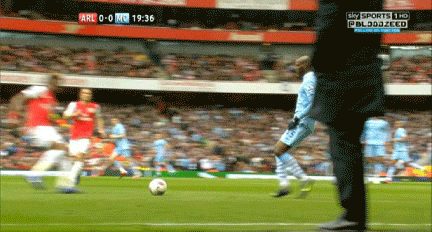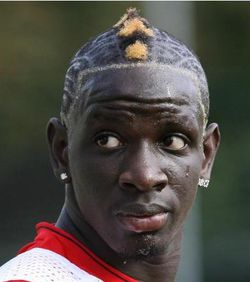Balotelli, meanwhile, received no punishment for the incident during the first-half at the Emirates Stadium, with referee Martin Atkinson somehow failing to spot the Italian's boot collide with the knee of Song.
There is an element of understanding when it comes to Atkinson seemingly missing the challenge, with replays suggesting his view was obstructed by a clutch of players.
Yet the decision by the Football Association not to take retrospective action against Balotelli is simply inexcusable, given the potentially dangerous nature of his challenge on Song.
The FA have, of course, provided their reasons - stating that, because one of the match officials had witnessed the 'coming together' of the players on Sunday, Balotelli will not be sanctioned.
"Retrospective action was introduced for off the ball incidents where there was no contest for possession and could not be deemed to be re-refereeing an incident," read a statement on TheFA.com.
"In agreement with FIFA, this is how ‘not seen’ incidents are dealt with retrospectively in England. It is a policy that is agreed with all football stakeholders."
The need for common sense to be used more freely in football has, in itself, almost become a cliche, so frequently is the suggestion made when governing bodies make baffling decisions.
But there are few clearer examples for when common sense should prevail than the incident in north London last weekend, such are the potentially serious consequences of such a tackle.
The safety of players should be paramount in the mind of officials and administrators, and career-threatening challenges must be outlawed, regardless of whether or not they are witnessed by referees or TV cameras.
The FA will cling to the fact they have their hands tied by Fifa when it comes to taking retrospective action but, one suspects, a suspension for Balotelli would be more forthcoming had Song suffered a broken leg.
Standing up to Fifa has, in recent times, become hobby of FA chairman David Bernstein, and it is imperative for strong leadership to prevent players from escaping sanction when a long suspension is a necessity.
Bernstein, Atkinson, Balotelli, Song, Roberto Mancini - and surely all spectators of the challenge - will be in agreement that it was worthy of a red card, yet the FA are seemingly unable to act robustly when necessary.
Although some European leagues operate under a different code of conduct and will impose greater bans than those in the Premier League, all are required to adhere to Fifa's regulations regarding retrospective action.
Yet the FA has previously demonstrated a willingness to take action in exceptional circumstances; as highlighted by the suspension given to then Manchester City defender Ben Thatcher in 2006.
Thatcher clattered into Portsmouth's Pedro Mendes with a horrendous elbow, yet was only booked at the time by referee Dermot Gallagher, as Mendes lay stricken on the turf.
With the challenge bordering on physical assault, Greater Manchester Police received a number of complaints, and City were prompted into imposing their own six-match suspension on Thatcher.
The FA then banned the former Spurs man for eight-games, with a further of ban of 15 games suspended for two years.
There is, of course, a difference in severity between the actions of Thatcher and those of Balotelli, yet there is no escaping that both significantly endangered the opponent.
Careers are at risk from such errant challenges, and it is vitally important the FA do all they can to ensure appropriate sanctions are taken against those committing the most dangerous of acts.








